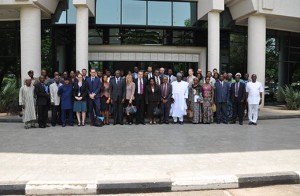Migration in West Africa is primarily motivated by reasons of employment and economic activity, highlighting the importance of the labour dimension of the region’s mobility dynamics.
West African labour migration is also primarily an intra-regional affair. An estimated 90% of the region’s 8.4 million migrants originate from ECOWAS countries, making it the area with the highest mobility of the African continent. Compared to the global rate of migration however (3.2%), the percentage of migrants among the West African population is similar (2.8%).
Although labour migration in the region continues to be male-dominant, female migration has increased slightly over the past decade, and now constitutes 46.5% of West African migration. Women continue to be disproportionately represented among low-skilled migrants, employed in areas such as cross-border trading.

Mr Hamid Ahmed(7th right) Ecowas Commissioner for trade,industry, customs and free movement with other partnering agencies at the launch ceremony of the project support to free movement of persons and migration in west Africa.
The support for free movement of persons and migration in west Africa(FMM West Africa) project with the aim of maximising the development potentials of free movement of persons and migration in West Africa was today 16th of April launched at the ECOWAS Headquarters in Abuja, Nigeria.
Its sole purpose is to design better policies and facilitate their implementation to enhance the contribution of migration to development and also support the effective implementation of the protocol on free movement of persons and ECOWAS common approach on migration and development.
Mr. Alan Munday, European Union delegation to Nigeria and ECOWAS stated that EU is particularly gratified with the launching as it demonstrates the commitment of the ECOWAS Commission and by extension its member states, in improving the free movement of persons in the region. He also said that as a result in the rise of urban population West Africa is undergoing a rapid population change which is having significant effects on migration patterns.
Munday further said if mobility takes place in a safe and orderly manner, it is also associated with improved outcome in terms of health, education, gender equality and women empowerment which can help communities prevent or cope with environmental degradation.
Mr. Munday recalled that the financial agreement between ECOWAS Commission and the European Union was signed in April 2013 which made available a grant of 26 million Euros for the project.
Also speaking, Mr. Lukas Gehrke, the Director, Southern Dimension International Centre for Migration Policy Development (ICMPD) said that Migration is about people.
He added that, regions of the world, the regional economic communities like the Economic Community of West African States or the European Union as different as they may be are the economic engines, the settings in which mobility can bring substantial economic, social and cultural progress.
He also said effective migration management both on national and regional levels are the preconditions to deliver on the project.
He also stated that ICMPD draws on its experience with regional migration and mobility frameworks and will bring in specialised mechanisms and tools to support all the stakeholders and partners in this project in creating better migration in the ECOWAS region. Some of their past projects include the Rabat Process, the Africa EU Migration, Mobility and Employment Partnership and the Migration EU Expertise (MIEUX).
Lukas added that ICMPD will intensify anti-trafficking and border management efforts in the region through policy development and training support to the ECOWAS Commission.
Mr. Dennis Zulu a representative of International Labour Organization (ILO) at the event, quoted Mr Guy Ryder, ILO Director General, as stating in his Vision Statement that the Organization’s Mandate on Labour Migration “requires it to reach out to those who are most vulnerable, who face great insecurity and for whom the denial of social justice is most cruel. They are often hard to reach, and yet they are great in number. The example of domestic workers shows what can be done. The ILO must also give priority to…migrant workers”.
He stated further that Access to Decent Work through the promotion of standards, development of sectorial strategies and access to social security, Labour Market Analysis, Skills recognition, Labour Market integration, Remittances and financial inclusion and better public perceptions of migrant workers are the ILO’s main priorities on Labour Migration.
He further disclosed that ILO priorities in line with the ECOWAS Free movement of persons and Migration Project, whose main areas of work on labour migration are: tripartite social dialogue, labour laws harmonization, Labour and skills mobility and public information, counter-trafficking prevention and prosecution activities, Data collection and management, capacity building of ECOWAS Staff and of ECOWAS Member States, Harmonisation of qualification recognition policies and Protection of migrant workers’ rights and social security coverage.
Similarly, Mrs Carmela Godeau, Regional Director for West and Central Africa, International Organization for Migration stated that IOM founded in 1951 is the principal intergovernmental organization in the field of migration and has a lead role at the global level of migration management activities. With 155 members states and 11 states with observer status she said the primary goal of IOM is to facilitate the orderly and humane management of migration.
The project is constituted for implementation in three stages (Inception, Implementation and closing) which aim to strengthen the capacities of the ECOWAS Commission, the capacities of National Institutions in ECOWAS member states and Mauritania and to promote the engagement of non-state actors and local authorities. In addition, the project is a 5 year plan and has three main implementation approaches- regional, national and local levels.
Support InfoStride News' Credible Journalism: Only credible journalism can guarantee a fair, accountable and transparent society, including democracy and government. It involves a lot of efforts and money. We need your support. Click here to Donate
